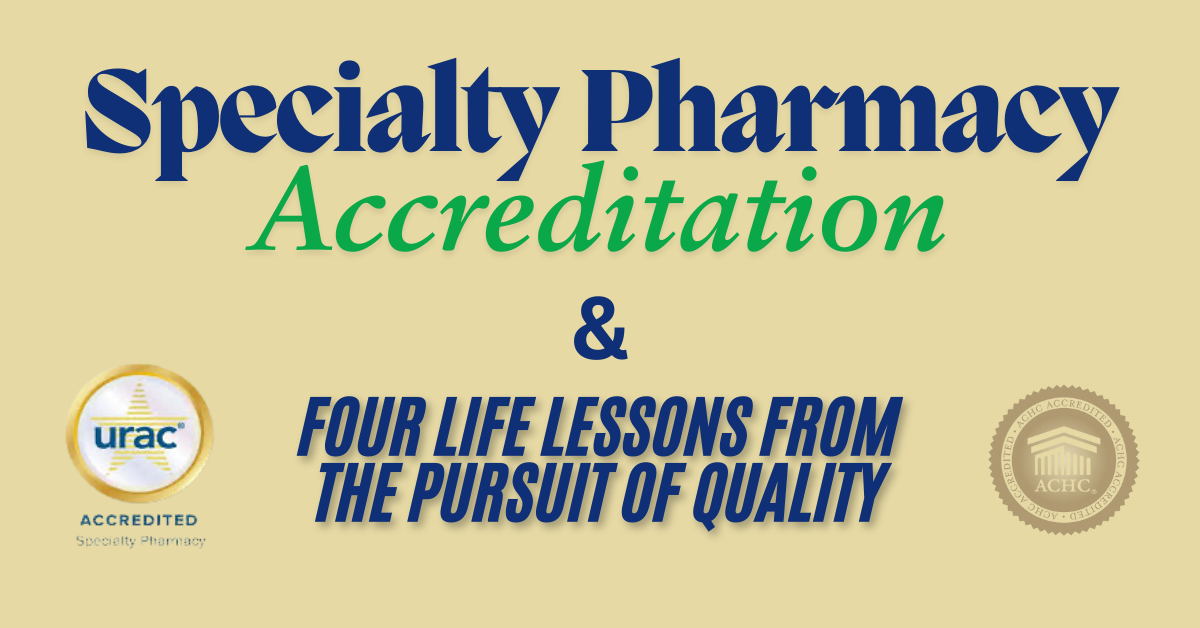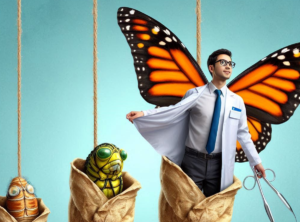Accreditation, for those who don’t know, is a rigorous process. But it teaches you lessons about life as well. I personally have the privilege and responsibility of navigating our organization’s specialty pharmacy program through both URAC and ACHC accreditation. We are currently going through the re-accreditation process, and the exercise has given me the opportunity to stop and ponder a bit about what I’m learning.
QUALITY
Accreditation is, at the most basic level, about quality. But there is a difference between aspiring to quality, and the ability to demonstrate and measure quality. Any licensed pharmacy operation hopefully aspires to a high level of quality. But being able to demonstrate that commitment through a multi-faceted process to an independent third-party auditor is something else. That’s accreditation. And that process, which I have gone through numerous times, has taught me several lessons; lessons that have also helped inform the way I live.
FOUR LESSONS
Lesson One: Quality is Hard and Complicated
If accreditation were easy, everyone would do it. But it is not. Rather, it is actually quite complicated. And rightly so! Putting together a robust and comprehensive specialty pharmacy program is a lot of work. Building the program is hard. Maintaining the program is difficult. And as a result, demonstrating your commitment to quality across all the various standards is not easy. URAC and ACHC have hundreds of standards that must be complied with, all of which were developed by a comprehensive evaluation of best practices across multiple organizations over a long period of time.
Carrying this “hardness” over to life, and there is a lesson here to learn. The lesson is to not always take the easy path. Personally, I think we need to do more hard things. Too often we take the path of least resistance. For example, we blame others, we give up, we choose to complain. How about you and I both decide to do something just a bit harder today?
C.S. Lewis said, “Hardships often prepare ordinary people for an extraordinary destiny.” Accreditation is hard, but that is actually why we do it.
Lesson Two: Quality is Humbling
Meeting all the accreditation standards can feel overwhelming. The vast amount of materials needed to demonstrate in a satisfactory way your compliance has a humbling effect. How can anyone do it all? The answer is…with a lot of help! Accreditation is a team project. No one does it entirely alone. You need a committed group of invested individuals and stakeholders, both inside and outside the pharmacy department. We partnered with HR, IT, Security, Facilities, and many other groups, in addition to our large pharmacy team, in order to provide all the support needed to show how we are meeting the expectations.
I need to be humbled regularly. Don’t you? Do you feel small when you stand beside the ocean, or look above at the stars, or think of the greatness of God? I’ve found the most useful and successful people I know are humble people. For more on humbling, read my post on attending the NASP conference.
Neil Armstrong observed, “It suddenly struck me that that tiny pea, pretty and blue, was the Earth. I put up my thumb and shut one eye, and my thumb blotted out the planet Earth. But I didn’t feel like a giant. I felt very, very small.” Accreditation makes you feel small. And that is a good thing.
Lesson Three: Quality Rubs Off
This is the most personal and applicable lesson. By diving deep into the quality expectations you are pushed and stretched and inevitably have your commitment to quality developed to an even greater degree. Come to think of it, this is true in life as well. Have you noticed that you become more and more like the people you spend the most time with? Therefore, be careful whom you chose to regularly hang around. This includes the shows you and I watch, the music we listen to, and the company we keep. When you choose your friends, you are choosing your destiny. Accreditation puts you in the company of other organizations equally interested in a high degree of quality, and that company will make you better.
Tony Robbins noted that “Your life is a direct reflection of the expectations of your peer group.” Choosing accreditation is picking a peer group that will push you to do better.
Lesson Four: Quality is a Journey
Quality is a journey. It is not a destination. We can always improve, always get better, always find another way to measure and demonstrate proficiency and excellence. Again, this relates to life, doesn’t it? Are you as good as you want to be…in anything? I know I’m not. Not even close. But if we look at the process of improvement as a journey, we begin to understand that the goal is to just keep getting incrementally better day by day. It’s not about reaching the top. It’s about climbing, growing, becoming a better version of what you were meant to be.
Emerson said, “Life is a journey, not a destination.”
CONCLUSION
Accreditation is rigorous, but it teaches you lessons about life as well. I’m grateful for what accreditation has done for my pharmacies. I’m even more grateful for what accreditation has done for me.



